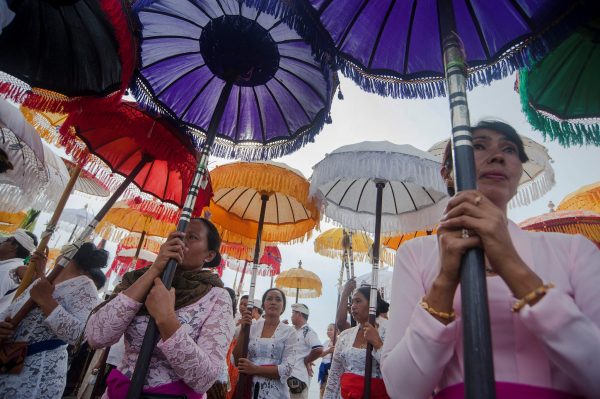The International Finance Group of the World Bank estimates that 11 million, or 43 per cent, of the 26 million SMEs in Indonesia are WSMEs. They contributed 10 per cent of Indonesia’s GDP in 2014. WSMEs’ roles are typically framed in terms of this contribution to the country’s economy. But WSMEs also contribute to social development by facilitating the economic empowerment of women.
Supporting WSMEs helps Indonesia to realise the UN Sustainable Development Goals, especially the targets of ‘gender equality’, ‘decent work and economic growth’, and ‘reduced inequality’. These goals are emphasised in the National Medium-Term Development Plan and the ‘Nawacita’ development agenda set by Indonesian President Joko Widodo.
WSMEs are overwhelmingly located in the food and fashion industries — industries where 51 per cent of the workers are women. These are fast-growing sectors in Indonesia’s creative economy cluster, and they typically act as growth engines for local economies. As a result, the food and fashion sectors have an outsized impact on poverty reduction in Indonesia and act as a buffer against business-cycle downturns.
But there are limitations on the growth of these important enterprises.
Agradaya, an emerging organic herb and spice WSME, provides higher incomes for their 200 farmer suppliers by streamlining supply chains. Despite this efficiency, Agradaya is struggling to scale up production to supply the offers from large manufacturing and pharmaceutical companies in Indonesia. This is for several reasons, not least of which is inadequate access to financing and government services. Not all WSMEs need or want ‘extra’ financing, but for the ones that need it, this extra funding can determine the ability to scale-up their businesses.
In a slightly different vein, Klastik Footwear is a medium-sized business based in Surabaya that organises a few dozen shoe makers in West Java and East Java Provinces. But to expand, Klastik must improve its leadership’s entrepreneurial skills and professional networks.
Other common difficulties for expansion include limited access to information about financial support, lack of business and entrepreneurial skills, lack of professional networks and limited government support and services at the local level.
Financial support is available for WSMEs, but female entrepreneurs tend to lack information about these options. Female entrepreneurs find that information about government funding programs is often limited, difficult to access or unclear. Information must be disseminated in a more accessible and transparent fashion, especially in emerging small cities in Java and eastern Indonesia. Using less technical and bureaucratic language and using more audiovisual forms of communication would help. Partnering with microfinance organisations to channel information to those who need it would be advantageous, as non-governmental organisations have relevant networks and knowledge about WSMEs in their local areas.
To enhance the business skills and professional networks of WSMEs, the Indonesian government should empower and strengthen the Creative Economy Agency (Badan Ekonomi Kreati or Bekraf). Bekraf was established in 2015 by President Joko Widodo.
Bekraf is responsible for disseminating information, facilitating coordination and collaboration among stakeholders and supporting all of the stakeholders that are involved in the creative economy cluster. Empowering Bekraf would allow it to support the growth of WSMEs through programs that build female entrepreneurs’ capabilities and expand their professional networks. To achieve this, Bekraf would need greater authority, an enhanced institutional capacity and an increasing its budget. This would allow Berkraf to go beyond its limited focus on ‘short-term planning and implementation’. Additionally, Bekraf’s current attempts to upgrade female entrepreneurs’ business skills and networks are generally ad hoc. Bekraf requires a more systematic method of planning, implementing and measuring its capacity building and networking programs.
Many WSMEs also face problems in accessing government services, such as filing corporate tax forms and receiving business permits, hygiene certificates and business permit extensions. Online platforms could enhance the ease of doing business but they are currently just an additional burden. Often, even after submitting forms online, entrepreneurs must still print, re-fill and then re-submit the form to the government office in the capital of the province.
This is especially burdensome for female entrepreneurs as they often juggle their business activities with housework or other duties. The effect is further compounded for food businesses that need to acquire many licenses and permits before being able to expand their operations. Improving local government services and online platforms needs to be taken more seriously. Greater utilisation of technology could increase the accessibility of government services.
It is important to listen to female entrepreneurs, particularly those who operate in small or emerging cities outside of Java. A win for such entrepreneurs is a win for Indonesia’s economy and development more broadly.
Naimah Talib is a Master of Public Policy student in the Crawford School at the Australian National University.

